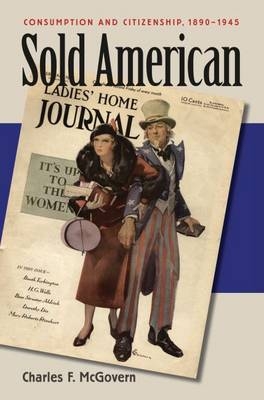
Sold American
Consumption and Citizenship, 1890-1945
Seiten
2006
|
New edition
The University of North Carolina Press (Verlag)
978-0-8078-3033-8 (ISBN)
The University of North Carolina Press (Verlag)
978-0-8078-3033-8 (ISBN)
- Titel ist leider vergriffen;
keine Neuauflage - Artikel merken
At the turn of the twentieth century, a consumer culture in the United States promoted constant spending to meet material needs and develop social identity and self-cultivation. This work examines the key players active in shaping this cultural evolution: advertisers and consumer advocates.
At the turn of the twentieth century, an emerging consumer culture in the United States promoted constant spending to meet material needs and develop social identity and self-cultivation. In "Sold American", Charles F. McGovern examines the key players active in shaping this cultural evolution: advertisers and consumer advocates. McGovern argues that even though these two professional groups invented radically different models for proper spending, both groups propagated mass consumption as a specifically American social practice and an important element of nationality and citizenship. Advertisers, McGovern shows, used nationalist ideals, icons, and political language to define consumption as the foundation of the pursuit of happiness. Consumer advocates, on the other hand, viewed the market with a republican-inspired skepticism and fought commercial incursions on consumer independence. The result, says McGovern, was a redefinition of the citizen as consumer. The articulation of an "American Way of Life" in the Depression and World War II ratified consumer abundance as the basis of a distinct American culture and history.
At the turn of the twentieth century, an emerging consumer culture in the United States promoted constant spending to meet material needs and develop social identity and self-cultivation. In "Sold American", Charles F. McGovern examines the key players active in shaping this cultural evolution: advertisers and consumer advocates. McGovern argues that even though these two professional groups invented radically different models for proper spending, both groups propagated mass consumption as a specifically American social practice and an important element of nationality and citizenship. Advertisers, McGovern shows, used nationalist ideals, icons, and political language to define consumption as the foundation of the pursuit of happiness. Consumer advocates, on the other hand, viewed the market with a republican-inspired skepticism and fought commercial incursions on consumer independence. The result, says McGovern, was a redefinition of the citizen as consumer. The articulation of an "American Way of Life" in the Depression and World War II ratified consumer abundance as the basis of a distinct American culture and history.
CHARLES F. McGOVERN is associate professor of American studies and history at the College of William and Mary and a former curator at the National Museum of American History in Washington, D.C. He is coeditor of Getting and Spending: European and American Consumer Societies in the Twentieth Century.
| Verlagsort | Chapel Hill |
|---|---|
| Sprache | englisch |
| Maße | 156 x 235 mm |
| Themenwelt | Geisteswissenschaften ► Geschichte ► Regional- / Ländergeschichte |
| Geschichte ► Teilgebiete der Geschichte ► Kulturgeschichte | |
| Sozialwissenschaften ► Soziologie | |
| Wirtschaft ► Betriebswirtschaft / Management ► Marketing / Vertrieb | |
| Wirtschaft ► Volkswirtschaftslehre ► Makroökonomie | |
| ISBN-10 | 0-8078-3033-X / 080783033X |
| ISBN-13 | 978-0-8078-3033-8 / 9780807830338 |
| Zustand | Neuware |
| Haben Sie eine Frage zum Produkt? |
Mehr entdecken
aus dem Bereich
aus dem Bereich
der stille Abschied vom bäuerlichen Leben in Deutschland
Buch | Hardcover (2023)
C.H.Beck (Verlag)
CHF 32,15
vom Mittelalter bis zur Gegenwart
Buch | Softcover (2024)
C.H.Beck (Verlag)
CHF 16,80


